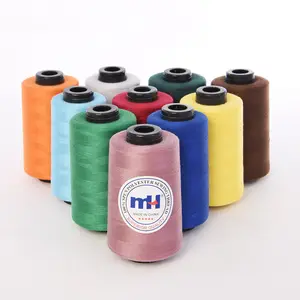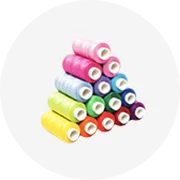
Hilo Encerado 1mm 210D/16 Polyester Braided Waxed Thread Leather Upholstery Sewing Waxed Cheap Wax Thread For Shoe Hand Sewing














A stitching thread refers to a type of thread specifically designed for sewing or stitching fabric or other materials together. It is commonly used in various textile and sewing applications, including garment construction, quilting, embroidery, and general repairs. Stitching threads come in different materials, thicknesses, and colors to suit the specific requirements of different sewing projects. Common materials for stitching threads include cotton, polyester, nylon, and silk. The choice of thread depends on the type of fabric being sewn and the desired characteristics of the finished project, such as strength, durability, and appearance.
Stitching threads come in various types, and the choice of thread depends on the specific requirements of the sewing project. One of the most prominent types is cotton stitching thread. Cotton thread is a natural fiber thread that is widely used for sewing lightweight to medium-weight fabrics. It is known for its softness and is often chosen for quilting, embroidery, and general sewing. Another type is the polyester thread, which is a synthetic thread known for its strength and durability. It is resistant to abrasion, chemicals, and sunlight, making it suitable for a wide range of applications, including garment construction, home decor, and outdoor projects. Nylon stitching thread is another type of stitching thread known for its strength and elasticity. It is often used for sewing items that require a bit of stretch, such as sportswear and swimwear. However, if one is looking for something on the high side, then silk thread is the best bet. It is a natural fiber thread known for its smooth and lustrous appearance. It is often used in high-end or delicate projects, such as fine garments and silk fabrics. Also, metallic threads are specialty threads that contain metallic fibers, adding a shiny and decorative element to embroidery and topstitching. They are often used for embellishing and adding a touch of glamour to projects.
A thick stitching thread provides strength to the seams, ensuring that they can withstand the stresses and strains associated with regular use. This is particularly important for items like garments and accessories that may experience frequent movement and washing. This is because the right thread can enhance the visual appeal of the seams by complementing or contrasting with the fabric. This is important for achieving a polished and professional finish in sewing projects. Furthermore, stitching threads are available in a wide array of colors, allowing sewers to match the thread seamlessly with the fabric. This ensures that the stitches blend in and do not distract from the overall design. Also, different fabrics require different types of threads. Choosing a thread that is compatible with the fabric's weight and characteristics ensures optimal performance and prevents issues like puckering or breakage. Lastly, stitching threads come in various materials and weights, making them versatile for a wide range of sewing projects. From lightweight threads for delicate fabrics to heavy-duty threads for durable items, there is a suitable option for every application.
Stitching threads find applications in various sewing projects across different industries. The first type is garment construction. Cross-stitch threads are widely used in the construction of garments. Whether sewing together fabric panels, attaching buttons, creating buttonholes, or hemming, threads play a crucial role in creating durable and functional clothing. Another application is quilting. Quilting threads are designed for use in quilting projects. They are often finer than regular sewing threads and come in a wide range of colors to complement the fabrics used in quilts. Embroidery is another application in which embroidery threads are specially designed for decorative stitching and embroidery work. They come in a variety of colors and may have a higher sheen to enhance the visual appeal of embroidered designs. Also, Threads are essential in the construction of accessories like bags, wallets, and belts. Heavy-duty threads are often chosen to ensure the longevity and strength of the stitched seams. Finally, stitching threads play a crucial role in the construction of footwear, from stitching together leather or fabric panels to attaching soles. The type of thread used can impact the durability and overall quality of the shoes.